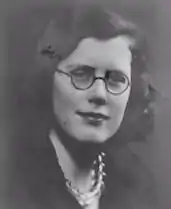Mary de Bunsen
Mary de Bunsen (29 May 1910 – 1982) was a British Air Transport Auxiliary pilot and author.
Mary de Bunsen | |
|---|---|
 | |
| Born | 29 May 1910 |
| Died | 1982 Weymouth |
| Nationality | United Kingdom |
| Known for | ATA pilot |
| Parent(s) | Maurice de Bunsen |
Life
Mary Berta de Bunsen was born in Madrid on 29 May 1910 to Sir Maurice William Ernest (1st Bt) de Bunsen and Bertha Mary Lowry-Corry. She was their fourth daughter and fourth child. She was expected to be a debutante, in attendance at balls and soirees but did not enjoy the lifestyle. She was lame from polio, suffered from a weak heart which left her often breathless and needed glasses to counteract short-sight.
However, this did not stop Bunsen from learning to fly, despite her parent's opposition. She considered it her escape route from “the ghastly fate of a daughter-in-waiting”.[1]
Through her flying connections, she was appointed to run PR and the inhouse magazine of Straight Corporation Ltd[2] a significant operator of British airlines, airports and flying clubs founded in 1935. In 1939 she wrote an article on ‘The place of the aerodrome in modern life’ for The Woman Engineer, journal of the Women's Engineering Society, showcasing ideas which Straight Corp. had for the development of smaller British airports into local cultural destinations. Suggestions for Ipswich Airport included a swimming pool, running track, theatre & sunbathing court, as well as the more expected car parks and restaurants.[2]
Piloting and Air Transport Auxiliary
She tried to join the Air Transport Auxiliary with the first group but was turned down on medical grounds. With a letter from her doctor confirming that she could see perfectly well with glasses, she was successful on 1 August 1941 and was posted to No. 15 ferry pool at Hamble in Hampshire, an all-women ATA ferry pool, under the command of Margot Gore and her second in command Rosemary Rees. Whilst there, Bunsen bought a canoe and took to paddling around the Solent with her mother as a way to counteract the stress of flying with the ATA.[1]
After a few heavy landings, Bunsen asked to be transferred to Scotland, where she was posted to "the saltmines" of Kirkbride ferry pool, and was a very successful pilot.[1]
Busen remained with the ATA, flying as a Pilot First Officer, until the end of the war when she was discharged on 1 August 1945.[3]
Postwar
After the war Bunsen flew to Philadelphia for pioneering heart surgery which she paid for herself. She survived, against the one in ten chance given by the surgeon.[1]
She later wrote about her experiences in the ATA in a book entitles Mount Up with Wings. She wrote articles about flying for various magazines including 'Practical Flying for Women'.
References
- "When women flew Spitfires". HistoryExtra. 2018-07-26. Retrieved 2020-03-05.
- "The Woman Engineer Vol 4". www2.theiet.org. Retrieved 2020-05-29.
- "ATA Personnel". archive.atamuseum.org. Retrieved 2020-05-29.
- "The "Always Terrified Airwomen" of Air Transport Auxiliary" (PDF).
- Schrader, H.P. (2006). Sisters in Arms: The Women Who Flew in World War II. Pen & Sword Books. p. 151. ISBN 978-1-4738-1827-9. Retrieved 2020-03-05.
- "Collection: Correspondence and Papers of Sir Maurice William Ernest de Bunsen". Bodleian Archives & Manuscripts. 2020-03-05. Retrieved 2020-03-05.
- Mary Ellis, A.T.T.M.F. (2016). A Spitfire Girl: One of the World's Greatest Female ATA Ferry Pilots Tells Her Story. Pen & Sword Books Limited. p. 144. ISBN 978-1-4738-9536-2. Retrieved 2020-03-05.